It’s Still About the Team: Re-building Leadership for Community Renewal

Part of a yearlong series on Torah wisdom about building and builders.
How can you build a community when the people have known nothing but hardship and slavery? Are promises of freedom and redemption enough? What does a people need to feel safe enough to step forward and begin something new?
These are timeless questions, from Moses’ struggle on behalf of the downtrodden Children of Israel until today, when communities around the globe are being rent apart by war and warlords. Syria and Central America may be half a world apart, but for the civilian populations, the result of a breakdown in the social order is the same – misery, desperation, and ultimately flight to places unknown in the hopes of finding a place to build a better life.
So too with the Children of Israel. They were enslaved for so long that when Moses brought God’s message of redemption they were unable to listen, because they experienced “shortness of spirit and cruel bondage.” Exodus 6:9
God’s promises to free the people, deliver them, redeem them, and take them into the land that God had promised to their forefathers, fell on deaf ears. They could not imagine building a new reality for themselves.
Even Moses was dispirited, and complained to God that the people wouldn’t listen to him, and moreover that he was “a man of impeded speech.”
Building something new takes courage, motivation, and the ability to stick with a task despite setbacks and impediments. Even the smallest projects require a concerted effort. To build a community? That takes many people working towards the same goal, each taking responsibility for their own part of the job, knowing that the disparate elements will come together to create a single whole. It takes leadership at all levels; one visionary alone cannot create a new reality without the support of others, both leaders and followers.
God knew that Moses was the right person for the job, but also knew that Moses couldn’t do it alone. So God built what today we would call a leadership team, consisting of God, Moses, and Aaron. And, according to modern feminist midrash, the team included Miriam, called niviyah, prophetess, when she led the women in song after the crossing of the Reed Sea.
Together, God and the three siblings were able to build up the peoples’ confidence until they were ready to leave Egypt. The ten plagues were more than a display of power to Pharaoh and the Egyptians. The plagues – which affected only the Egyptians and not the Children of Israel – were signs to the slaves that their cause was just, that their leaders had the strength and courage to help them build a new reality for themselves.
As we read the story of their flight from slavery to freedom, we know that there will be bumps in the road. Again and again, the peoples’ will fails them, and it will fall upon the shoulders of their leaders to ensure the success of their audacious venture. Although most of the time it is Moses who takes the brunt of their complaints, both Aaron and Miriam will have opportunities to step forward and help lead the people.
This is the genius of the leadership team that God built, and it offers a blueprint for today’s community-builders. Each of the siblings had different gifts. Moses had terrific leadership skills, but he couldn’t do it alone. He needed Aaron’s talents as a peace-maker and Miriam’s strengths as a nurturer.
As a pulpit rabbi, I quickly learned that I could not lead my congregation without the help and support of a strong group of lay leaders. Together, we have built a community that encourages its members – both long-time and newcomers – to step into leadership roles.
As our community grows and we build new lines of connection amongst ourselves, we keep in mind that building a community is an ongoing process, and requires a constant influx of new members, new ideas, and new leaders.
This does not mean that transitions are easy. Change can be frightening. It takes strong leaders to help communities flourish and welcome new people, new ideas, new ways of viewing the world.

Today I believe that our nation is at a crossroads, floundering as our leaders refuse to understand the value of welcoming people who are different, and who have forgotten the stirring words of Emma Lazarus that are inscribed on the Statue of Liberty:
“Give me your tired, your poor, your huddled masses yearning to breathe free,
the wretched refuse of your teeming shore.
Send these, the homeless, tempest-tost to me…”
Sadly, the people seeking refuge in our nation today are not being met with open arms. Instead, they are met by walls and barriers, both physical and psychological. They are trying to enter a country that has chosen to turn them away, to deny their humanity and treat them like vermin, not human beings.
People are flocking to our borders, seeking safety and the promise of a better life for themselves and their children. Like the Children of Israel in the desert, they are undertaking arduous, dangerous journeys to a place they have never seen.
The crimes against humanity that are being perpetuated by our own government are tearing down what America has striven to build. It represents an utter disregard for the promise that the builders of our nation made to themselves and to their descendants, that this would be a place where new ideas could take seed and the social experiment that is democracy could flourish.
The challenge is clear. Our task is to seek out and support leaders who are willing to rebuild that which is in danger of being destroyed. May we be blessed with the courage and strength to do so.


By Rabbi Jennifer Singer. Sketchnotes by Steve Silbert.

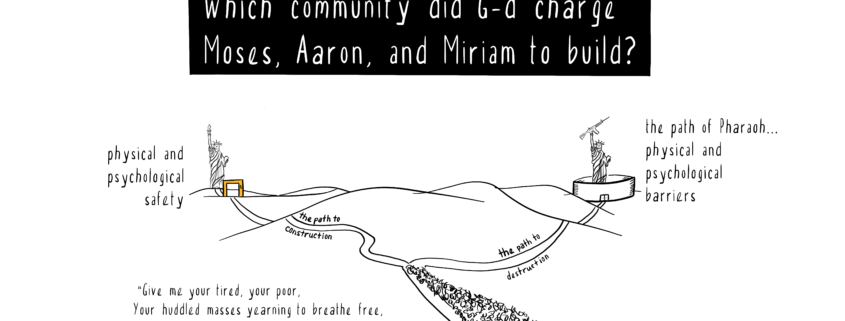
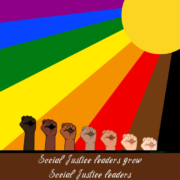

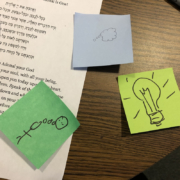
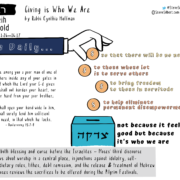
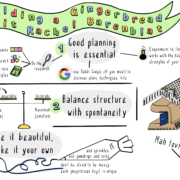
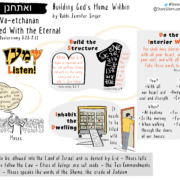


Trackbacks & Pingbacks
[…] It’s Still About The Team: Re-Building Leadership for Community Renewal […]
Comments are closed.